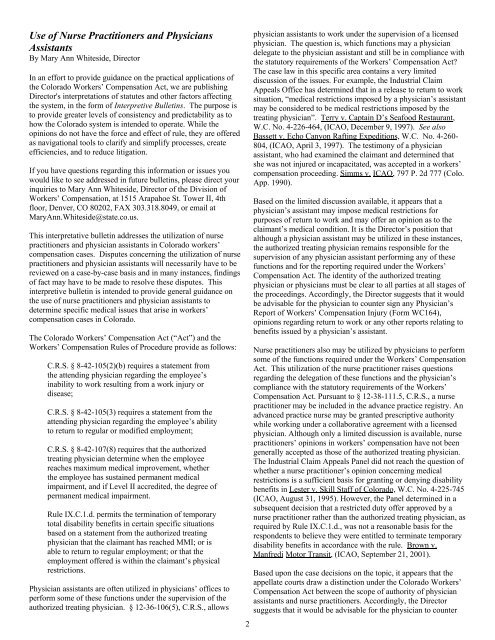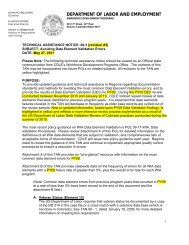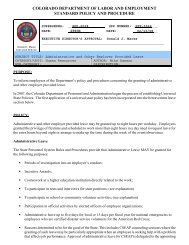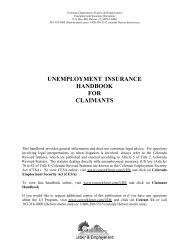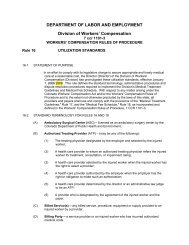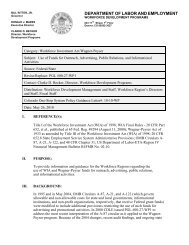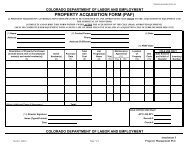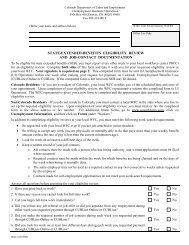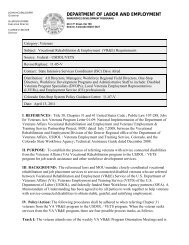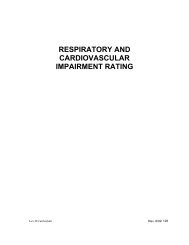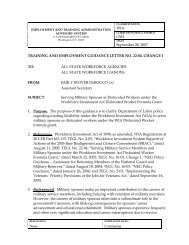Volume 20 - Colorado Department of Labor and Employment
Volume 20 - Colorado Department of Labor and Employment
Volume 20 - Colorado Department of Labor and Employment
Create successful ePaper yourself
Turn your PDF publications into a flip-book with our unique Google optimized e-Paper software.
Use <strong>of</strong> Nurse Practitioners <strong>and</strong> PhysiciansAssistantsBy Mary Ann Whiteside, DirectorIn an effort to provide guidance on the practical applications <strong>of</strong>the <strong>Colorado</strong> Workers’ Compensation Act, we are publishingDirector's interpretations <strong>of</strong> statutes <strong>and</strong> other factors affectingthe system, in the form <strong>of</strong> Interpretive Bulletins. The purpose isto provide greater levels <strong>of</strong> consistency <strong>and</strong> predictability as tohow the <strong>Colorado</strong> system is intended to operate. While theopinions do not have the force <strong>and</strong> effect <strong>of</strong> rule, they are <strong>of</strong>feredas navigational tools to clarify <strong>and</strong> simplify processes, createefficiencies, <strong>and</strong> to reduce litigation.If you have questions regarding this information or issues youwould like to see addressed in future bulletins, please direct yourinquiries to Mary Ann Whiteside, Director <strong>of</strong> the Division <strong>of</strong>Workers’ Compensation, at 1515 Arapahoe St. Tower II, 4thfloor, Denver, CO 80<strong>20</strong>2, FAX 303.318.8049, or email atMaryAnn.Whiteside@state.co.us.This interpretative bulletin addresses the utilization <strong>of</strong> nursepractitioners <strong>and</strong> physician assistants in <strong>Colorado</strong> workers’compensation cases. Disputes concerning the utilization <strong>of</strong> nursepractitioners <strong>and</strong> physician assistants will necessarily have to bereviewed on a case-by-case basis <strong>and</strong> in many instances, findings<strong>of</strong> fact may have to be made to resolve these disputes. Thisinterpretive bulletin is intended to provide general guidance onthe use <strong>of</strong> nurse practitioners <strong>and</strong> physician assistants todetermine specific medical issues that arise in workers’compensation cases in <strong>Colorado</strong>.The <strong>Colorado</strong> Workers’ Compensation Act (“Act”) <strong>and</strong> theWorkers’ Compensation Rules <strong>of</strong> Procedure provide as follows:C.R.S. § 8-42-105(2)(b) requires a statement fromthe attending physician regarding the employee’sinability to work resulting from a work injury ordisease;C.R.S. § 8-42-105(3) requires a statement from theattending physician regarding the employee’s abilityto return to regular or modified employment;C.R.S. § 8-42-107(8) requires that the authorizedtreating physician determine when the employeereaches maximum medical improvement, whetherthe employee has sustained permanent medicalimpairment, <strong>and</strong> if Level II accredited, the degree <strong>of</strong>permanent medical impairment.Rule IX.C.1.d. permits the termination <strong>of</strong> temporarytotal disability benefits in certain specific situationsbased on a statement from the authorized treatingphysician that the claimant has reached MMI; or isable to return to regular employment; or that theemployment <strong>of</strong>fered is within the claimant’s physicalrestrictions.Physician assistants are <strong>of</strong>ten utilized in physicians’ <strong>of</strong>fices toperform some <strong>of</strong> these functions under the supervision <strong>of</strong> theauthorized treating physician. § 12-36-106(5), C.R.S., allows2 physician assistants to work under the supervision <strong>of</strong> a licensedphysician. The question is, which functions may a physici<strong>and</strong>elegate to the physician assistant <strong>and</strong> still be in compliance withthe statutory requirements <strong>of</strong> the Workers’ Compensation Act?The case law in this specific area contains a very limiteddiscussion <strong>of</strong> the issues. For example, the Industrial ClaimAppeals Office has determined that in a release to return to worksituation, “medical restrictions imposed by a physician’s assistantmay be considered to be medical restrictions imposed by thetreating physician”. Terry v. Captain D’s Seafood Restaurant,W.C. No. 4-226-464, (ICAO, December 9, 1997). See alsoBassett v. Echo Canyon Rafting Expeditions, W.C. No. 4-260-804, (ICAO, April 3, 1997). The testimony <strong>of</strong> a physicianassistant, who had examined the claimant <strong>and</strong> determined thatshe was not injured or incapacitated, was accepted in a workers’compensation proceeding. Simms v. ICAO, 797 P. 2d 777 (Colo.App. 1990).Based on the limited discussion available, it appears that aphysician’s assistant may impose medical restrictions forpurposes <strong>of</strong> return to work <strong>and</strong> may <strong>of</strong>fer an opinion as to theclaimant’s medical condition. It is the Director’s position thatalthough a physician assistant may be utilized in these instances,the authorized treating physician remains responsible for thesupervision <strong>of</strong> any physician assistant performing any <strong>of</strong> thesefunctions <strong>and</strong> for the reporting required under the Workers’Compensation Act. The identity <strong>of</strong> the authorized treatingphysician or physicians must be clear to all parties at all stages <strong>of</strong>the proceedings. Accordingly, the Director suggests that it wouldbe advisable for the physician to counter sign any Physician’sReport <strong>of</strong> Workers’ Compensation Injury (Form WC164),opinions regarding return to work or any other reports relating tobenefits issued by a physician’s assistant.Nurse practitioners also may be utilized by physicians to performsome <strong>of</strong> the functions required under the Workers’ CompensationAct. This utilization <strong>of</strong> the nurse practitioner raises questionsregarding the delegation <strong>of</strong> these functions <strong>and</strong> the physician’scompliance with the statutory requirements <strong>of</strong> the Workers’Compensation Act. Pursuant to § 12-38-111.5, C.R.S., a nursepractitioner may be included in the advance practice registry. Anadvanced practice nurse may be granted prescriptive authoritywhile working under a collaborative agreement with a licensedphysician. Although only a limited discussion is available, nursepractitioners’ opinions in workers’ compensation have not beengenerally accepted as those <strong>of</strong> the authorized treating physician.The Industrial Claim Appeals Panel did not reach the question <strong>of</strong>whether a nurse practitioner’s opinion concerning medicalrestrictions is a sufficient basis for granting or denying disabilitybenefits in Lester v. Skill Staff <strong>of</strong> <strong>Colorado</strong>, W.C. No. 4-225-745(ICAO, August 31, 1995). However, the Panel determined in asubsequent decision that a restricted duty <strong>of</strong>fer approved by anurse practitioner rather than the authorized treating physician, asrequired by Rule IX.C.1.d., was not a reasonable basis for therespondents to believe they were entitled to terminate temporarydisability benefits in accordance with the rule. Brown v.Manfredi Motor Transit, (ICAO, September 21, <strong>20</strong>01).Based upon the case decisions on the topic, it appears that theappellate courts draw a distinction under the <strong>Colorado</strong> Workers’Compensation Act between the scope <strong>of</strong> authority <strong>of</strong> physicianassistants <strong>and</strong> nurse practitioners. Accordingly, the Directorsuggests that it would be advisable for the physician to counter


